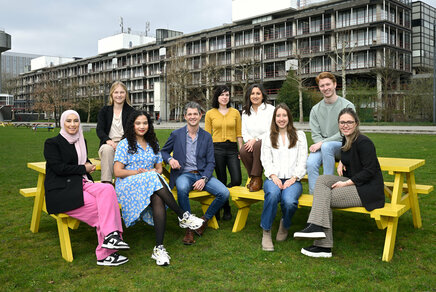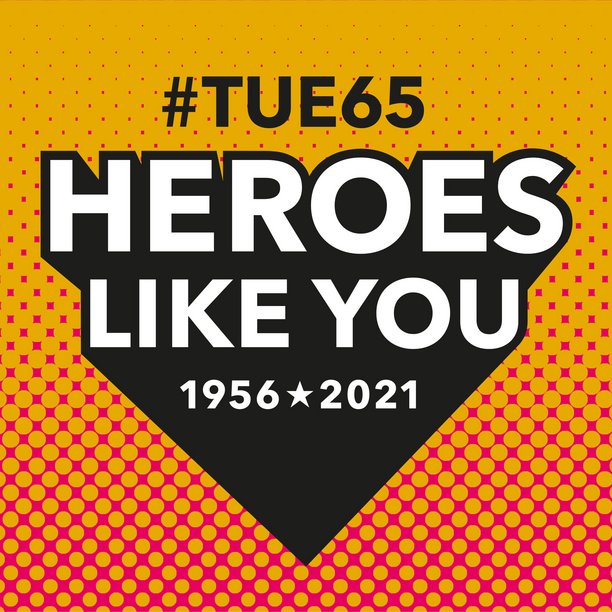A diploma enveloped in corona life lessons
October's ‘heroes of the month’: our graduates, who, thanks to the pandemic, had unexpected obstacles strewn along their path to the finish line.
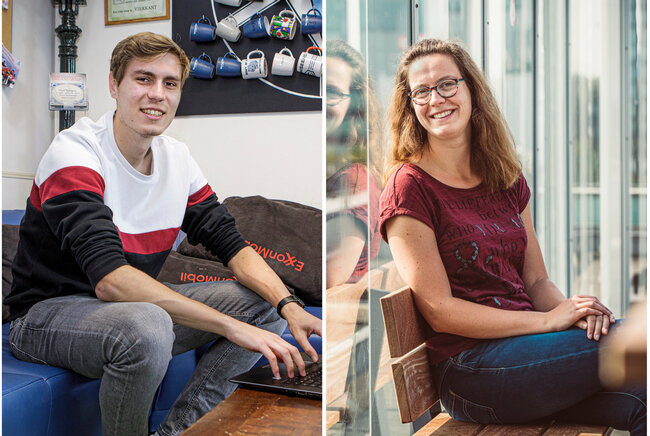
Schedules, rhythms, routines, and rituals - all that was familiar went out the window when, in March 2020, not only the Netherlands, but our campus, too, shut. Gone, for many graduates, was much of what they had to hold on to. Especially in a phase that, even without global pandemic, is already very different, intense, and challenging. Their perseverance has, however, been rewarded. They have gained not only that coveted diploma but also valuable insights and experiences.
“Trying to figure out everything alone isn’t always the best idea”
Mariska van der Struijk defended her master’s thesis on August, 3rd. She graduated in the field of Integrated Circuits from the deparment of Electrical Engineering.
“All things considered, yes.” Mariska van der Struijk responds modestly when asked if she is proud of how she got through the corona crisis as a master's student: "I diligently continued studying and completed everything properly." But she cannot and will not deny one thing. "My social life virtually stopped for a year and a half. Spontaneous meetings, getting to know new people; I really missed that."
Everyday life indeed came to a standstill when COVID-19 swept into the Netherlands in the early spring of 2020. "People didn't want to meet up, and many students moved back to their parents’ homes - as did I.” And that "actually went quite smoothly. Although I did have to get used to, for example, mom always insists on having dinner at 5:30.”
Just before that, she had still thought corona and the lockdowns would not be so bad here, in the Netherlands. Okay, so the student association bar closed the one day, and the canteens the next. “And at one point, the campus’ student VPN connection was turned off. But education is so important, I thought, 'There's no way the university is going to close.'"
You could see how much effort everyone was making to arrange everything well
Mariska van der Struijk, graduate Electrical Engineering
But it did. “It was super weird,” says Van der Struijk, who, at that stage, was only six months into her master’s program. She was still following courses, she says, and "for some of those, the transition to online wasn’t as easy as for others. But, after a week and a half, everything was running pretty smoothly. You saw how much effort everyone was making to arrange everything; there was a lot of back and forth understanding and patience, even when, to begin with, things didn't go so well."
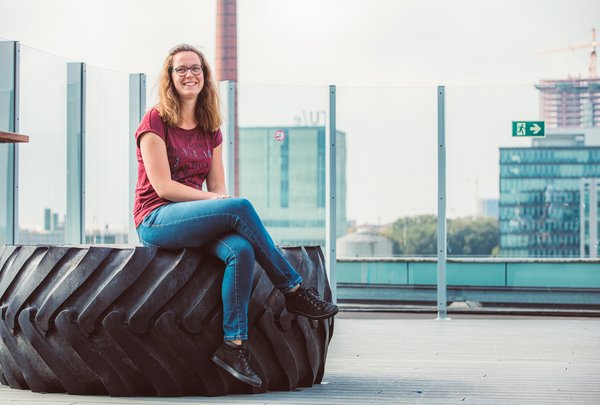
Studying online and at home became more challenging for Van der Struijk once she passed almost all her master’s classes, and began her graduate work. "During my courses, I still had regular contact with others. But when I was doing my graduate work, it was 'me and my laptop', with at most one or two meetings a week. If I couldn't work something out, I’d email my supervisor and he’d often respond that same day - but the threshold is nonetheless a little higher."
It didn’t work at home; I missed the uni, missed having people around me
Mariska van der Struijk, graduate Electrical Engineering
She missed the campus dynamic, that everyday rhythm, and often struggled to get out of bed in the morning, explains Van der Struijk. "I'd plan on getting up at eight but would only stumble out of bed at ten. I also missed going to Het Walhalla after a day of studying (The Thor student association bar, ed.) to blow off some steam and mingle with people." A combination of procrastination, a lack of motivation, and a gnawing feeling of dissatisfaction about her progress eventually forced this master' student to approach her supervisor for help: "It wasn't working at home; I missed the uni, missed having people around me. My supervisor immediately arranged a workstation for me on campus for two days a week. That helped tremendously."
At first, she found it difficult to reach out. "At one point, we had received an email saying that students with issues could go to uni to study. But I thought, 'I don't have autism or anything like that; I'm not a foreign student with extra challenges. Those were the examples mentioned in the email'."
Resilience
However - and that is something she admits the pandemic taught her: "You may be keen on solving everything yourself, but that's not always the best option. If something's wrong, you have to tell someone. Because more people are there for you than you might realize." But, adds Van der Struijk: "I think we've all learned we can do more than we thought. In terms of working online, but also in a broader sense, we truly are very resilient."
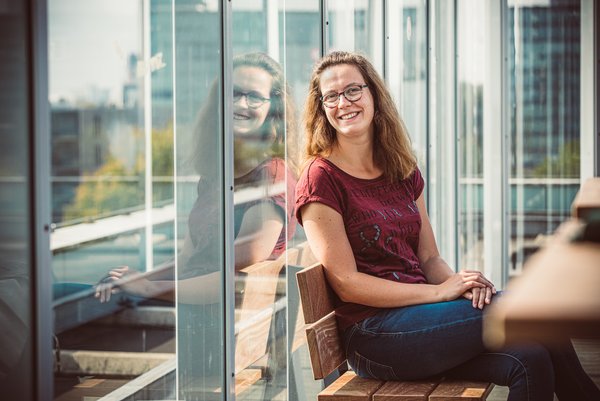
And so, on August 3, despite the extra obstacles, thanks to the pandemic, she crossed the finish line and defended her master's thesis. "I'd have liked to do my internship in a company or somewhere else, but Covid didn't allow for that." The student had to forgo the internship abroad, which had been her goal.
She is pleased she could defend her thesis in a hybrid setting, with a few people, including her parents, present. “They’d never been to the uni before, except on open day,” she says, laughing.
After graduating, she did nothing for two months, admits Van der Struijk - besides landing a job at Dialog Semiconductor. She managed to squeeze in a short holiday at the end of September - due to the corona restrictions, the longer, post-graduation dream holiday to Australia and New Zealand will have to wait a little longer: “Their borders are still closed.”
She is now ‘pretty much over’ the corona crisis. “I did my best, kept to the rules, and am vaccinated, as is everyone I know. I want to be able to go out again". Though, she expects picking up the social thread will be more restrained at times. "It also depends on how well you know people already. But I think, for now, I might be a bit more cautious with new people. And, for instance, automatically keep my distance for a while or not shake hands straight away."
"Life was pretty monotonous during corona"
Douwe Orij was at the point of completing his Bachelor’s degree in Chemical Engineering and Chemistry when the corona crisis brought everyday life to a halt. The high school where he was doing his teacher training at the time also closed.
As our conversation was winding down, Orij made a few observations. Many people moved houses during the pandemic. They started cycling. Or began bringing plants into the house. "Not me," he says, laughing. "But I did keep getting photos from other people, saying 'Look at my new plant'."
He mixed things up a little by playing soccer, which finally got going again after the summer of 2020. Not that getting back into training was smooth and problem-free: "After the first half, I kept getting a niggling pain in my groin. I'd been sitting so much during corona that something in my pelvis had gone wrong. I really should have gotten my legs moving more, but I'm not into running or other individual sports; I'm a team player."
So, it was a lot of literal sitting still during a time when Orij wanted to do anything but be still. Although it seemed nice in the beginning: "It provided some downtime at first, especially because you could and had to do everything from home." When the pandemic brought the Netherlands, too, to a standstill in the spring of 2020, he was about to start his Bachelor’s degree project (B.E.P.). And he was teaching at a secondary school in Tilburg as part of the teacher training program he was following. In addition, he was in his candidate year at the study association, T.S.V. 'Jan Pieter Minckelers' (Japie), and was trying to find sponsors for the trip the association intended to take to Australia last summer.
Change of scenery
"I was busy. My room was where I slept, worked, and lived - all at once. I noticed I had trouble finding my rhythm in that setting. As soon as the uni partially reopened, I was there; I really needed that change of scenery."
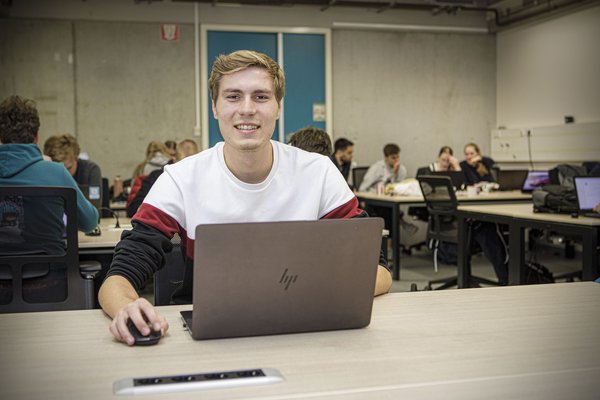
By spring 2020’s third quartile, he had been able to complete one more course and take one more exam. "I ended up sacrificing the summer for my B.E.P.," he says. His internship also ran a bit late, after his school in Tilburg had to close for months due to corona. He taught freshman chemistry, and when the school was forced to close, his classes were all doing the same lab project. "I simply couldn't switch everything online. It also took a while before Teams and the like were up and running really well."
Corona's challenges brought out a kind of creativity
Douwe Orij, Bachelor's graduate Chemical Engineering and Chemistry
In the meantime, Orij made the best of it and began, among other things, a YouTube channel and Instagram account for his students where he shared some of the material: "Short summaries, certain paragraphs, repeats. That provided another point of contact because some students dropped out of the picture a little then. They didn't join online; didn't respond to anything." He acknowledges that teaching-wise, he might not have gotten the most out of his internship. "But corona did provide new challenges, and those, in turn, brought a kind of creativity."
It was, thus, with a slight delay, that he finished his B.E.P. and internship last year. He was awarded his bachelor's degree during a small in-person ceremony in the Blauwe Zaal that included only the graduates. That was anything but normal, with his loved ones as distant, online onlookers. But it was the best option at the time during the pandemic, Orij believes. "I enjoyed it just fine anyway."
After that, he took a gap year and joined his study association's board. This association played a major role in monitoring the quality of education during the pandemic and providing feedback to lecturers. It also maintained contact with companies for online lectures and training courses and tried to support demotivated students.
Not 'sexy', yet instructive
It was, partially because of all kinds of large events being canceled, perhaps not the 'sexiest' time to do a year on the board, admits Orij, "but I don't regret it in the least. I'd just about finished teaching, and, looking back, it really shows you what you've learned in a year like that. Things like communication and efficiency have greatly improved. And I learned to express myself better, for example, about feelings or problems. The university's attention to student-wellbeing has genuinely changed me in that respect."
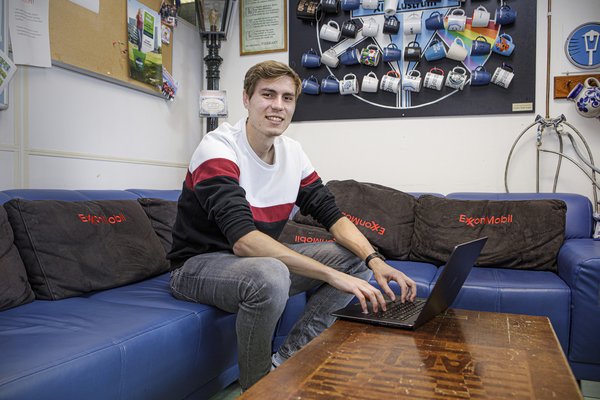
And, when it comes to events, he is presently making up for last time. Orij is a member of the student working group involved in MomenTUm, the TU/e's foremost annual academic event. There, the university puts its graduates in the limelight, among other things. As treasurer, Orij is responsible for things like the Thursday-night student party budget; he helped design part of the house style, too, including the well-known socks that all graduates receive.
"I'm very much looking forward to that. At first, we could only accommodate 750 party-goers, but I'm pleased that we can now fill the venue. Because 750 people seems a lot, but in such a big place, it's not much at all," he knows from experience, having been involved, as part of Japie, in organizing one of the parties during introduction week. "But it was, nevertheless, great that it could be held again."
Our entire board became infected after 'dancing with Janssen'
Douwe Orij, Bachelor's graduate Chemical Engineering and Chemistry
As far as Orij is concerned, that is also true for the now-infamous 'dancing with Janssen' days, in June. It was a carefree time out after doing a quick Covid test (Orij has since been vaccinated). And after months of curfew that, according to him, had taken its toll on, particularly, students. "I enjoyed that week immensely. We all got infected with Covid. It's actually a miracle that we managed to make it through the entire previous year, corona-free since we were always in pretty close proximity to each other."
He has since begun with his Chemical and Process Technology Master and is trying to find the balance of 'normal' student life again, after his gap year and the 18 pandemic months. Is he proud of what he accomplished for himself and others during the pandemic? Orij pauses for a moment. "I'm actually always working toward my next goals. I always move on to something new fairly quickly, even though I've achieved quite a bit. Perhaps, that's especially where I need other people. It's only then that you realize: 'I've truly done it again'."
More on our strategy

![[Translate to English:] [Translate to English:]](https://assets.w3.tue.nl/w/fileadmin/_processed_/c/f/csm_BvOF_2024_0319_AEV_license_TUe_Dirk_van_Meer_-_CORE_1__c976e259a5.jpg)
